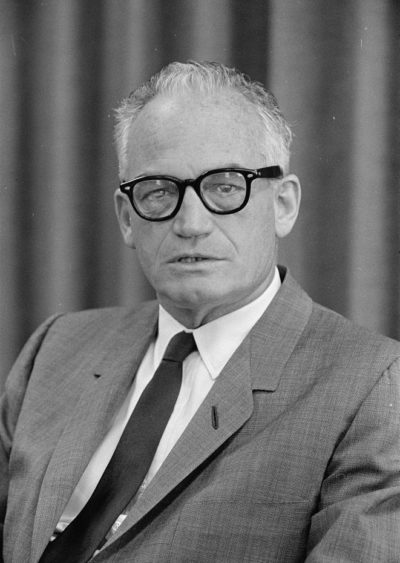Barry Goldwater (Barry Morris Goldwater)

Barry Morris Goldwater (January 2, 1909 – May 29, 1998) was an American politician and businessman who was a five-term United States Senator from Arizona (1953–65, 1969–87) and the Republican Party’s nominee for President of the United States in the 1964 election. Despite losing the election by a landslide, Goldwater is the politician most often credited for sparking the resurgence of the American conservative political movement in the 1960s. He also had a substantial impact on the libertarian movement. Barry Goldwater rejected the legacy of the New Deal and fought through the conservative coalition against the New Deal coalition. He mobilized a large conservative constituency to win the hard-fought Republican primaries. Though raised an Episcopalian, he was the first candidate with ethnically Jewish heritage to be nominated for President by a major American party (his father was Jewish). Goldwater’s conservative campaign platform ultimately failed to gain the support of the electorate and he lost the 1964 presidential election to incumbent Democrat Lyndon B. Johnson, bringing down many conservative Republican office-holders as well. Jeff Fishel says, “The conservative faction of the party was on the defensive as a result of the magnitude of the election losses.”
Barry Goldwater returned to the Senate in 1969, and specialized in defense policy, bringing to the table his experience as a senior officer in the Air Force Reserve. In 1974, as an elder statesman of the party, Goldwater successfully urged President Richard Nixon to resign when evidence of a cover-up in the Watergate scandal became overwhelming and impeachment was imminent. By the 1980s, the increasing influence of the Christian right on the Republican Party so conflicted with Goldwater’s views that he became a vocal opponent of the religious right on issues such as abortion, gay rights, and the role of religion in public life. After narrowly winning re-election to the Senate in 1980, he chose not to run for a sixth term in 1986, and was succeeded by fellow Republican John McCain. A significant accomplishment in his career was the passage of the Goldwater–Nichols Act of 1986, which restructured the higher levels of the Pentagon by placing the chain of command from the President to the Secretary of Defense directly to the commanders of the Unified Combatant Commands. Barry Goldwater’s public appearances ended in late 1996 after he suffered a massive stroke; family members then disclosed he was in the early stages of Alzheimer’s disease. He died on May 29, 1998, at the age of 89 at his long-time home in Paradise Valley, Arizona, of complications from the stroke. His funeral was co-officiated by both a reverend and a rabbi. His ashes were buried at the Episcopal Christ Church of the Ascension in Paradise Valley, Arizona. A memorial statue set in a small park has been erected to honor the memory of Goldwater in that town, near his former home and current resting place.
Born
- January, 02, 1909
- USA
- Phoenix, Arizona
Died
- May, 29, 1998
- USA
- Paradise Valley, Arizona
Cause of Death
- stroke
Cemetery
- Christ Church of the Ascension
- Paradise Valley, Arizona
- USA



